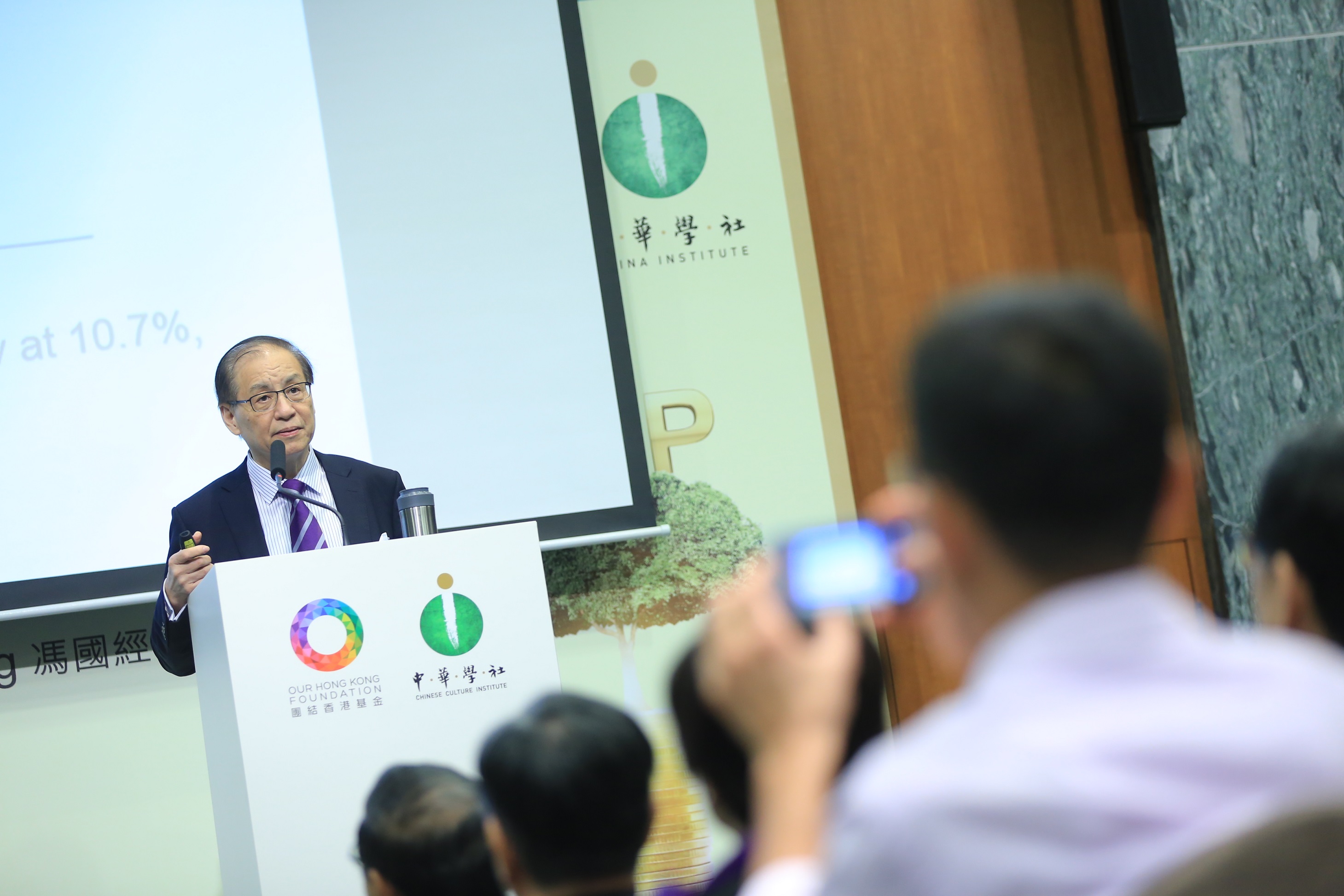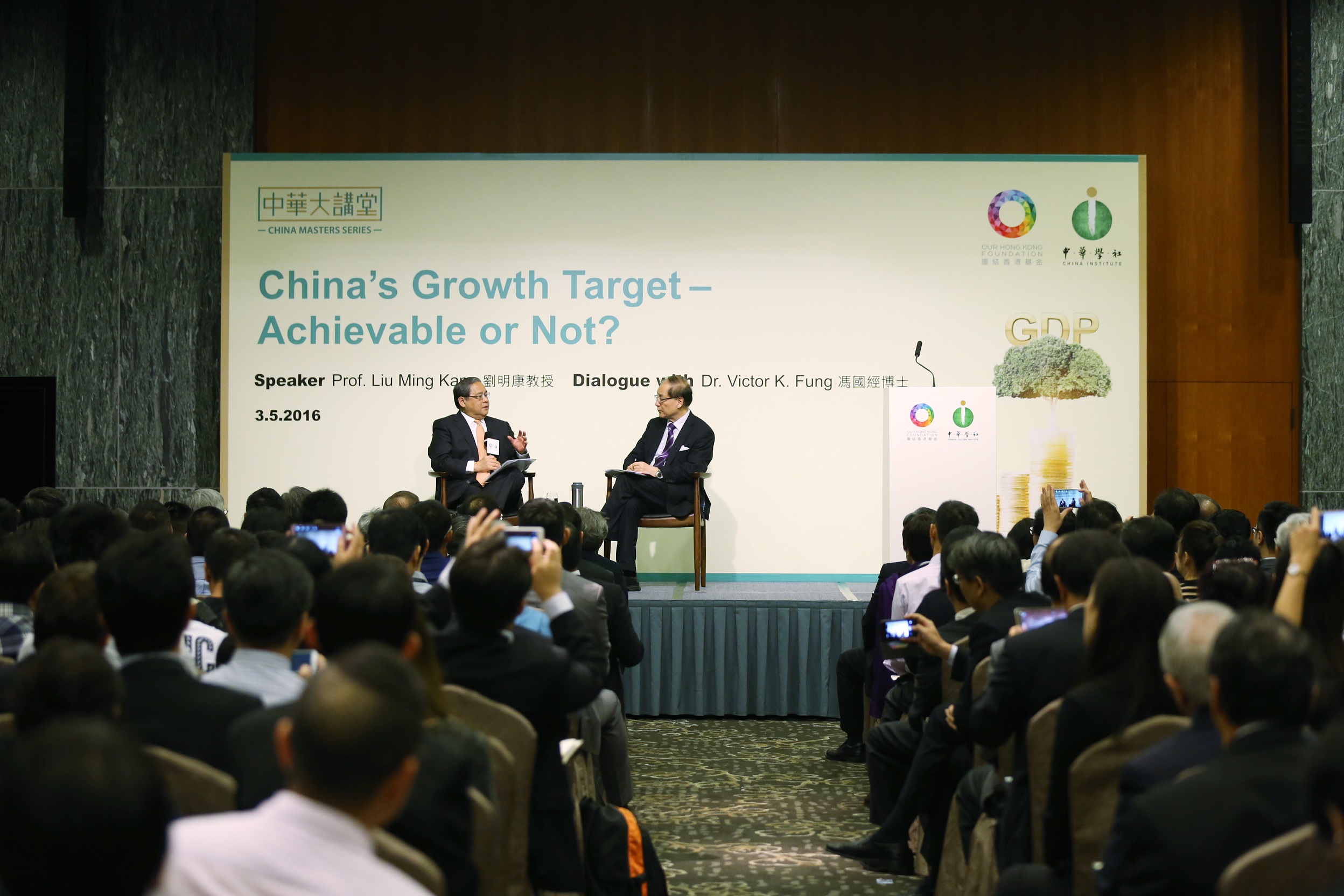Prof Liu Ming Kang urges Hong Kong to seize Belt & Road Opportunities
(Hong Kong, 3 May 2016) It is imperative for China’s economy to undergo structural readjustments, with a contraction in the secondary sector not being out of the ordinary, said Professor Liu Mingkang, BCT Distinguished Research Fellow at the Institute of Global Economics and Finance at the Chinese University of Hong Kong and former chairman of the China Banking Regulatory Commission.
To achieve its target of 6.5% GDP growth for 2016, he added, China must speed up transforming and upgrading its economy, with the service industry growing more than 10% this year so as to offset the influence on its overall economic growth exerted by the secondary sector being significantly readjusted.
Professor Liu made those points in his talk, entitled “Prospects for China’s Growth Target”, given today at Asia Society Hong Kong Centre at the invitation of China Institute, Our Hong Kong Foundation. Expounding the economic situation of China today, Professor Liu pointed out that, as the country’s growth must be powered by reform and innovation, the government should proactively bring about institutional environments, infrastructures and taxation policies that are conducive to invention, and enable private enterprises, universities and research centres to play an even greater role in nurturing fresh ideas.

China’s “One Belt, One Road” initiative would become fresh power driving Asia’s economy in the next decade, Professor Liu added. By giving full play to its distinctive advantages such as rule of law, versatile financial services, open and free flow of information, a large pool of talents, and free movement of capital, Hong Kong would certainly find those “belt and road” programmes bringing great opportunities for its own development.
“We are honoured to have invited Professor Liu, former Chairman of the China Banking Regulatory Commission, to come and give this talk about China, the world’s second largest economy,” said Mrs Eva Cheng, Executive Director of OHKF. “We hope the talk will help business sectors in Hong Kong and abroad to gain a full and accurate perception of how China’s economy is working, so that they can seize the new opportunities arising with it.”
“We are convinced that Hong Kong as a global financial hub will benefit from the ‘One Belt, One Road’ programmes, and hence make its share of contribution to the region’s common prosperity,” she added.
Professor Liu’s talk today, the latest event in China Masters Series as hosted by China Institute, Our Hong Kong Foundation, was attended by personages from local and international financial sectors, business leaders, consular officials in Hong Kong, youth group leaders, and guests from local academic and industrial fields.

About the Speaker
Professor Liu Mingkang is currently Member of the Standing Committee of Chinese People’s Political Consultative Conference (CPPCC), Vice-Chairman of the Committee for Economic Affairs of the CPPCC, and former Chairman of the China Banking Regulatory Commission.
He currently serves as BCT Distinguished Research Fellow at the Institute of Global Economics and Finance at the Chinese University of Hong Kong, Distinguished Fellow at the Asia Global Institute at the University of Hong Kong, and is Honorary Dean of Lingnan (University) College at Sun Yet-Sen University, Guangzhou.
He held several high positions in banking institutions and government agencies, including Chairman and President of the Bank of China, Chairman of China Everbright Group, Deputy Governor of the People’s Bank of China, Deputy Governor of China Development Bank, and Deputy Governor of Fujian Province and Secretary General of the Fujian Provincial Government.
Professor Liu received his MBA from City University of London, and has received honorary doctorates from the City University of London, Lingnan University (Hong Kong), and the Chinese University of Hong Kong.
